Comprehensive Guide to Garden Maintenance in Upminster
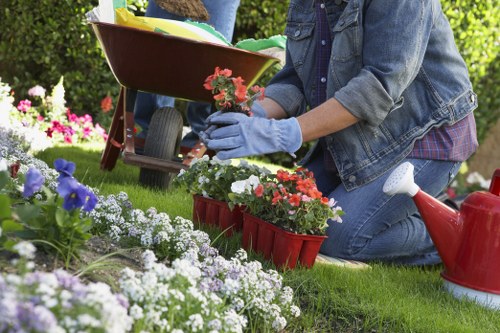
Garden maintenance is an essential aspect of preserving the beauty and health of your outdoor space. In Upminster, a vibrant town with its unique climate and soil conditions, maintaining a garden requires specific knowledge and techniques. Whether you’re a seasoned gardener or a beginner, understanding the fundamentals of garden maintenance can help you create a stunning and sustainable outdoor environment.
Upminster’s temperate climate provides an ideal setting for a wide variety of plants. However, the local weather patterns, including seasonal changes and occasional rainfall, necessitate a tailored approach to garden care. Proper maintenance not only enhances the aesthetic appeal of your garden but also promotes the longevity and vitality of your plants.
In this article, we will explore the key aspects of garden maintenance in Upminster, covering everything from soil preparation and plant selection to regular upkeep and seasonal tasks. By following these guidelines, you can ensure that your garden remains a beautiful and thriving space year-round.
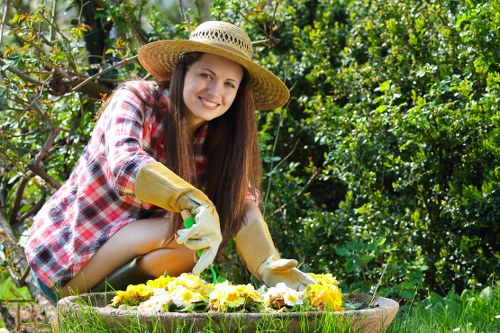
Understanding Upminster’s Climate and Soil
To maintain a healthy garden in Upminster, it’s crucial to understand the local climate and soil conditions. Upminster experiences a temperate maritime climate, characterized by mild winters and cool summers. This climate is conducive to growing a wide range of plants, but it also presents specific challenges that gardeners must address.
The soil in Upminster varies, but it is generally well-draining with a mix of clay and loam. Good soil quality is the foundation of successful gardening. Conducting a soil test can help you determine the pH level and nutrient content, allowing you to amend the soil as needed to create an optimal growing environment for your plants.
Incorporating organic matter such as compost or well-rotted manure can improve soil structure, enhance nutrient content, and promote beneficial microbial activity. Regularly testing and amending your soil ensures that your plants receive the necessary nutrients to thrive.
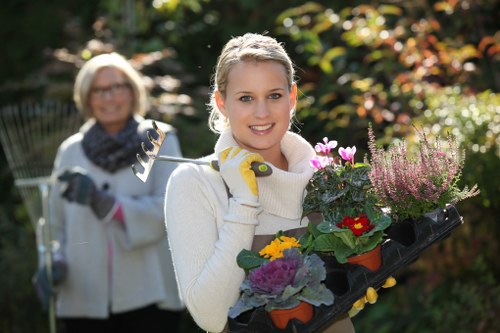
Essential Garden Maintenance Practices
1. Soil Preparation and Fertilization
Soil preparation is a critical step in garden maintenance. Properly prepared soil provides a stable base for plant growth, ensuring that roots can establish themselves effectively. Here are some key practices:
- Testing Soil: Determine the pH and nutrient levels to identify any deficiencies or imbalances.
- Amending Soil: Add compost, manure, or other organic materials to improve soil texture and fertility.
- Mulching: Apply mulch to regulate soil temperature, retain moisture, and suppress weeds.
2. Plant Selection and Placement
Choosing the right plants for Upminster’s climate is essential for a successful garden. Consider the following factors:
- Hardiness: Select plants that can withstand the local temperature ranges.
- Sunlight: Ensure that plants are placed in locations that match their sunlight requirements.
- Soil Compatibility: Choose plants that thrive in the existing soil conditions or adjust the soil accordingly.
3. Regular Watering and Irrigation
Consistent watering is vital for maintaining plant health. In Upminster, the rainfall is generally sufficient, but supplemental watering may be necessary during dry spells. Implementing an efficient irrigation system can help manage water usage effectively.
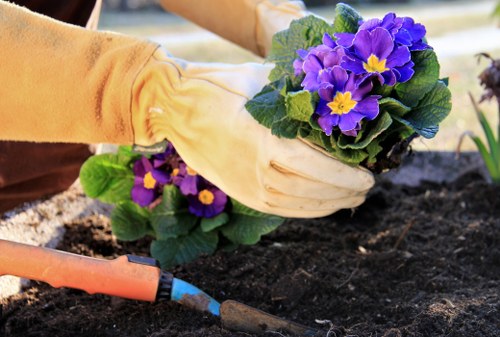
Seasonal Garden Maintenance Tasks
Spring Maintenance
Spring is a time of renewal and preparation for the growing season. Key tasks include:
- Pruning: Trim dead or damaged branches to encourage healthy growth.
- Planting: Introduce new plants and perennials to your garden.
- Weed Control: Remove weeds that compete with your plants for nutrients and water.
Summer Maintenance
During the summer months, focus on:
- Watering: Ensure plants receive adequate moisture, especially during heatwaves.
- Pest Management: Monitor for pests and implement control measures as needed.
- Deadheading: Remove spent flowers to encourage continued blooming.
Autumn Maintenance
As the weather cools, prepare your garden for winter by:
- Leaf Removal: Clear fallen leaves to prevent fungal diseases.
- Soil Amendment: Add compost or other organic matter to enrich the soil for the next season.
- Plant Protection: Mulch around plants to insulate roots against frost.
Winter Maintenance
In the winter, focus on:
- Tool Care: Clean and store garden tools properly to extend their lifespan.
- Planning: Design your garden layout and plan for next year’s planting.
- Protection: Cover sensitive plants to shield them from harsh weather conditions.
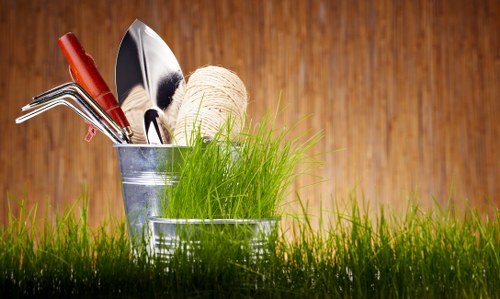
Choosing the Right Tools and Equipment
Having the appropriate tools is essential for efficient garden maintenance. Some must-have tools for gardeners in Upminster include:
- Pruning Shears: For trimming and shaping plants.
- Garden Fork: Useful for turning and aerating the soil.
- Watering Can or Hose: Ensure consistent watering of your plants.
- Weeding Tools: Help in removing unwanted weeds effectively.
- Wheelbarrow: For transporting soil, compost, and other materials.
Investing in high-quality tools can make garden maintenance tasks easier and more enjoyable. Regularly maintaining your tools, such as cleaning and sharpening blades, ensures they remain effective and last longer.
In addition to manual tools, consider using modern equipment like electric or battery-powered lawn mowers and trimmers to save time and effort, especially for larger gardens.
Proper storage of tools is also important to prevent rust and damage. Keep them in a dry, sheltered area and use protective coverings when necessary.

Eco-Friendly Garden Maintenance Practices
Adopting eco-friendly practices in your garden not only benefits the environment but also promotes a healthier garden ecosystem. Here are some sustainable maintenance tips:
- Composting: Recycle garden waste and kitchen scraps to create nutrient-rich compost for your soil.
- Rainwater Harvesting: Collect and use rainwater for irrigation to reduce reliance on municipal water supplies.
- Natural Pest Control: Use beneficial insects, organic sprays, and companion planting to manage pests without harmful chemicals.
- Native Plants: Incorporate native species that are adapted to the local climate and require less maintenance.
- Mulching: Conserves moisture, suppresses weeds, and improves soil health naturally.
Benefits of Eco-Friendly Practices
Implementing sustainable practices in your garden maintenance routine offers numerous benefits:
- Environmental Protection: Reduces pollution and conserves natural resources.
- Cost Savings: Lowers water and fertilizer usage, saving money in the long run.
- Enhanced Soil Health: Promotes a thriving soil ecosystem, leading to healthier plants.
- Biodiversity: Encourages a diverse range of plants and wildlife, creating a balanced ecosystem.

Hiring Professional Garden Maintenance Services in Upminster
While many garden maintenance tasks can be handled by homeowners, hiring a professional may be beneficial for more extensive or specialized work. Professional garden maintenance services in Upminster offer expertise, efficiency, and customized care tailored to your garden’s unique needs.
Benefits of hiring professionals include:
- Expert Knowledge: Professionals possess in-depth understanding of local climate, soil, and plant species.
- Time Savings: Outsourcing maintenance frees up your time for other activities.
- Consistent Care: Regular, scheduled maintenance ensures your garden remains in optimal condition.
- Specialized Services: Access to services such as landscape design, irrigation installation, and pest management.
When selecting a garden maintenance service in Upminster, consider the following factors:
- Experience: Look for companies with a proven track record and positive reviews.
- Services Offered: Ensure the provider offers the specific services you require.
- Pricing: Obtain quotes and compare pricing structures to find a service that fits your budget.
- Customer Service: Choose a company that communicates effectively and prioritizes customer satisfaction.
Investing in professional garden maintenance can transform your outdoor space, making it a beautiful and relaxing sanctuary.

DIY Garden Maintenance Tips
For those who prefer a hands-on approach, here are some DIY garden maintenance tips to keep your Upminster garden thriving:
1. Regular Weeding
Weeds compete with your plants for nutrients and water. Regularly removing weeds helps your desired plants grow stronger and healthier.
2. Proper Pruning Techniques
Pruning not only shapes your plants but also removes dead or diseased branches. Learn the appropriate pruning methods for different plant types to avoid damaging them.
3. Efficient Watering Practices
Water your garden early in the morning or late in the evening to minimize evaporation. Use drip irrigation or soaker hoses to deliver water directly to the roots, promoting efficient usage.
4. Mulching
Apply a layer of mulch around your plants to retain moisture, regulate soil temperature, and suppress weed growth. Organic mulches like bark, straw, or compost are excellent choices.
5. Fertilization
Provide your plants with the necessary nutrients by using appropriate fertilizers. Organic options like compost tea or fish emulsion are environmentally friendly and beneficial for soil health.
6. Pest and Disease Management
Monitor your plants regularly for signs of pests or diseases. Early detection allows for timely intervention, preventing widespread damage. Use natural remedies or targeted treatments to address issues without harming beneficial insects.
7. Seasonal Planting
Plant species that are suited to each season, ensuring continuous growth and blooming throughout the year. Rotate crops and incorporate a variety of plants to maintain soil fertility and reduce pest buildup.

Creating a Sustainable Garden in Upminster
Creating a sustainable garden involves practices that maintain ecological balance and promote environmental health. In Upminster, where community and green living are valued, sustainable gardening can significantly contribute to the local ecosystem.
Benefits of a Sustainable Garden
- Environmental Impact: Reduces carbon footprint and conserves natural resources.
- Cost Efficiency: Lowers utility bills through efficient water and energy use.
- Healthier Ecosystem: Supports biodiversity and provides habitats for local wildlife.
- Aesthetic Appeal: Creates a beautiful, harmonious outdoor space.
Steps to Achieve Sustainability
- Native Plant Selection: Use native plants that are adapted to the local environment, requiring less water and maintenance.
- Composting: Recycle organic waste to create compost, enriching the soil naturally.
- Rainwater Harvesting: Install rain barrels to collect and store rainwater for irrigation.
- Natural Pest Control: Encourage beneficial insects and use organic methods to manage pests.
- Energy-Efficient Practices: Utilize solar-powered garden lights and energy-saving equipment.
Implementing Permaculture Principles
Permaculture is a sustainable design philosophy that emphasizes harmony with nature. Incorporating permaculture principles in your Upminster garden involves:
- Observation: Understand the natural patterns and interactions within your garden.
- Diversity: Plant a variety of species to create a resilient ecosystem.
- Resource Management: Optimize the use of water, soil, and other resources efficiently.
- Minimal Waste: Reuse and recycle materials to reduce waste generation.
- Community Engagement: Share resources and knowledge with neighbors to foster a collective effort towards sustainability.

Enhancing Your Garden’s Aesthetic Appeal
Aesthetic appeal plays a significant role in garden maintenance. A visually pleasing garden in Upminster can serve as a personal sanctuary and a place for social gatherings. Here are some tips to enhance your garden’s beauty:
1. Color Coordination
Choose plants with complementary colors to create a cohesive and attractive palette. Consider the color wheel to select shades that harmonize well together.
2. Texture and Layering
Incorporate plants with varying textures and heights to add depth and interest. Layering taller plants at the back and shorter ones in the front creates a dynamic and visually appealing arrangement.
3. Focal Points
Create focal points such as a feature tree, a water fountain, or a sculpture to draw attention and add character to your garden.
4. Seasonal Interest
Plant a variety of species that bloom at different times of the year to ensure your garden remains vibrant throughout all seasons.
5. Pathways and Structures
Incorporate pathways, pergolas, or benches to provide structure and functionality. These elements also enhance the overall design and usability of your garden.
6. Lighting
Use garden lighting to highlight key features and create a magical ambiance during the evening hours. Solar-powered lights are an eco-friendly option that adds both beauty and practicality.
7. Water Features
Adding water features like ponds, fountains, or birdbaths can create soothing sounds and attract wildlife, enhancing the sensory experience of your garden.

Maintaining Lawn Health
The lawn is often the centerpiece of a garden, providing a green backdrop for other plants and activities. Maintaining a healthy lawn in Upminster involves several key practices:
1. Mowing
Regular mowing encourages dense grass growth and prevents weeds from taking over. Set your mower to the appropriate height for your grass type to promote optimal health.
2. Aeration
Aerating the soil helps improve oxygen flow, water penetration, and nutrient uptake. This is especially important in compacted soils common in Upminster’s urban gardens.
3. Fertilization
Apply lawn fertilizers based on the specific needs of your grass. Organic fertilizers can provide essential nutrients while improving soil structure.
4. Weed Control
Identify and remove weeds promptly to prevent them from spreading and competing with your grass. Use selective herbicides or manual removal for effective control.
5. Pest Management
Monitor your lawn for signs of pests such as grubs or insects. Implement appropriate pest control measures to protect your grass from damage.
6. Watering
Ensure your lawn receives adequate water, especially during dry periods. Deep, infrequent watering encourages deep root growth and drought resistance.
7. Overseeding
Overseeding helps fill in bare spots and maintain a thick, lush lawn. Choose grass varieties suited to Upminster’s climate for the best results.
8. Dethatching
Remove excess thatch to prevent it from suffocating the grass roots. Regular dethatching promotes healthier grass growth and overall lawn vitality.

Integrating Sustainable Practices
Sustainability in garden maintenance goes beyond eco-friendly choices; it involves creating a garden that thrives in harmony with its environment. Here’s how you can integrate sustainable practices into your Upminster garden:
1. Perennial Planting
Incorporate perennial plants that come back year after year, reducing the need for replanting and conserving resources.
2. Companion Planting
Plant species that support each other’s growth and deter pests naturally. For example, planting marigolds with vegetables can repel harmful insects.
3. Vertical Gardening
Utilize vertical space to grow climbing plants, maximizing limited garden areas and promoting efficient use of space.
4. Permaculture Design
Adopt permaculture principles to create a self-sustaining garden ecosystem that minimizes waste and maximizes resource efficiency.
5. Renewable Energy
Incorporate solar-powered lighting and irrigation systems to reduce energy consumption and lower utility bills.
6. Organic Practices
Use organic fertilizers and pest control methods to maintain soil health and promote a chemical-free garden environment.
7. Native Wildlife Support
Create habitats for local wildlife by providing food sources, shelter, and water, enhancing biodiversity in your garden.
8. Sustainable Materials
Choose garden materials that are durable, recyclable, and have a low environmental impact, such as reclaimed wood or natural stone.
9. Efficient Irrigation
Implement drip irrigation or smart watering systems that adjust based on weather conditions, conserving water and ensuring plants receive adequate moisture.
10. Composting
Turn kitchen scraps and garden waste into valuable compost, enriching your soil naturally and reducing landfill waste.

Conclusion
Effective garden maintenance in Upminster requires a combination of knowledge, planning, and consistent effort. By understanding the local climate and soil conditions, selecting appropriate plants, and implementing sustainable practices, you can create a beautiful and thriving garden that enhances your outdoor living space.
Whether you choose to maintain your garden yourself or hire professional services, the key to success lies in regular care and attention. Embrace the seasonal changes, invest in the right tools, and adopt eco-friendly methods to ensure your garden remains a source of pride and enjoyment for years to come.
Ready to transform your garden? Contact us today to schedule your garden maintenance service in Upminster and take the first step toward a more beautiful and sustainable outdoor space.